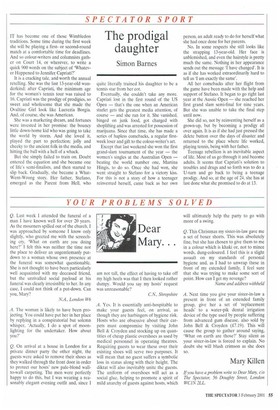The prodigal daughter
Simon Barnes
IT has become one of those Wimbledon traditions. Some time during the first week she will be playing a firstor second-round match at a comfortable time for deadlines. And so colour-writers and columnists gather on Court 14, or wherever, to write a quick 900 words on the subject of 'Whatever Happened to Jennifer Capriati?'
It is a cracking tale, and worth the annual retelling. She was the last 13-year-old wunderkind; after Capriati, the minimum age for the women's tennis tour was raised to 16. Capriati was the prodigy of prodigies, so sweet and wholesome that she made the Ovaltine Girl look like Lucrezia Borgia. And, of course, she was American.
She was a marketing dream, and fortunes were invested in her promise: the bouncy little down-home kid who was going to take the world by storm. And she loved it, played the part to perfection; jolly and cheeky to the ancient folk in the media, and hitting the ball with a hell of a whack.
But she simply failed to train on. Doubt entered the equation and she became one of life's semi-finalists, and then started to slip back. Gradually, she became a WhatWent-Wrong story. Her father, Stefano, emerged as the Parent from Hell, who
quite literally trained his daughter to be a tennis star from her cot.
Eventually, she couldn't take any more. Capriati lost in the first round of the US Open — that's the one when an American starlet gets the greatest media attention, of course — and she ran for it. She vanished, binged on junk food, got charged with shoplifting and was arrested for possession of marijuana. Since that time, she has made a series of hapless comebacks, a regular firstweek loser and gift to the colour-writer's art.
Except that last weekend she won the first grand-slam tournament of the year — the women's singles at the Australian Open — beating the world number one, Martina Hingis, to do so. Once she had won, she went straight to Stefano for a victory kiss. For this is not a story of how a teenager reinvented herself, came back as her own person, an adult ready to do for herself what she had once done for her parents.
No. In some respects she still looks like the strapping 13-year-old. Her face is unblemished, and even the hairstyle is pretty much the same. Nothing in her appearance sends out the message 'I have changed'. It is as if she has worked extraordinarily hard to tell us 'I am exactly the same'.
All her comebacks after her flight from the game have been made with the help and support of Stefano. It began to go right last year at the Aussie Open — she reached her first grand slam semi-final for nine years. But she was unable to take the final step until now.
She did so, not by reinventing herself as a grown-up, but by becoming a prodigy all over again. It is as if she had just pressed the delete button over the days of disaster and returned to the place where life worked, playing tennis, being with her father.
Teenage rebellion is an inevitable aspect of life. Most of us go through it and become adults. It seems that Capriati's solution to troubles and drugs and so forth was to do a U-turn and go back to being a teenage prodigy. And so, at the age of 24, she has at last done what she promised to do at 13.


























































 Previous page
Previous page